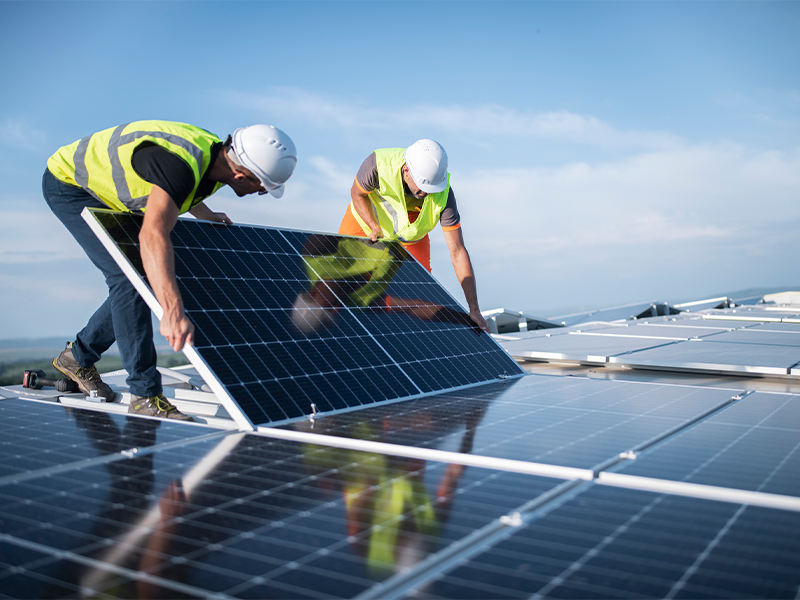Green Solar Power with Simply Solar Illinois – Go Eco-Friendly Today
Green Solar Power with Simply Solar Illinois – Go Eco-Friendly Today
Blog Article
Just How Solar Power Can Help You Save Cash and Decrease Your Carbon Impact
The assimilation of solar power right into your power portfolio provides a compelling opportunity for both financial savings and ecological stewardship. As numerous government incentives come to be offered, the question occurs: just how can one properly navigate the preliminary financial investments and recurring benefits of solar modern technology to make the most of both economic and ecological gains?
Understanding Solar Power Cost Savings
While the change to solar power frequently includes a preliminary financial investment, recognizing solar power cost savings is crucial for house owners and organizations alike. Solar power systems can significantly decrease electricity bills by harnessing the sunlight's energy, translating into considerable lasting economic benefits. By producing their very own electrical energy, customers decrease reliance on grid power, which goes through changing prices. These financial savings can build up in time, often bring about a rapid return on financial investment.
In addition, solar energy systems may receive numerous monetary rewards, including tax credit scores and rebates, better improving their cost-effectiveness. The accessibility of web metering allows individuals to market excess energy back to the grid, producing an additional profits stream. These elements add to the general savings related to solar energy.

Along with route monetary savings, solar energy provides the included benefit of raising property value. Houses equipped with solar panels are typically much more eye-catching to purchasers, as they promise reduced power prices - Simply Solar Illinois. Comprehending these components is crucial for any individual considering solar power, as it highlights not simply the prospective monetary gains, yet additionally the wider ecological and economic advantages of adopting renewable resource services
First Expenses vs. Long-Term Perks
When assessing solar energy, it is necessary to consider the preliminary prices against the long-lasting advantages. The upfront investment for solar panels, setup, and related equipment can be substantial, often varying from $15,000 to $30,000, depending upon the system dimension and home energy requirements. This initial expense may deter some house owners; nevertheless, it is important to think about the prospective financial savings in time.
Once installed, solar energy systems can substantially reduce and even eliminate month-to-month electrical power bills, causing significant long-term economic benefits. Studies suggest that house owners can conserve anywhere from $10,000 to $30,000 over the life expectancy of their solar system, generally 25 years. In addition, lots of states offer incentives, tax credits, and refunds that can offset preliminary expenses, making solar a lot more obtainable.

Decreasing Your Carbon Impact
Minimizing your carbon footprint is an essential consideration in today's ecologically aware society, and taking on solar energy is just one of the most effective strategies to attain this goal. Solar power is a clean, renewable source that significantly lessens reliance on fossil fuels, which are significant contributors to greenhouse gas exhausts.

Moreover, the widespread adoption of solar innovation motivates the advancement of environment-friendly jobs and sustains innovations in energy storage and efficiency. The even more individuals and organizations purchase solar power, the greater the collective reduction in carbon exhausts, promoting a cleaner atmosphere for future generations.
Government Rewards and Discounts
Adopting solar power not just benefits the atmosphere yet can likewise result in substantial economic cost savings, especially with the schedule of federal government motivations and rebates. Various federal, state, and neighborhood programs are made to encourage home owners and services to buy solar energy systems, making the shift a lot more affordable.
Among one of the most noticeable incentives is the Federal Financial Investment Tax Obligation Credit Score (ITC), which permits planetary system proprietors to deduct a significant percent of the installment costs from their government taxes. This incentive has been crucial in reducing the in advance costs related to solar power systems. Additionally, several states supply their very own tax obligation credit scores, gives, and refunds that can even more boost cost savings.
Furthermore, some try here local federal governments supply real blog estate tax exceptions for solar installments, making certain that house owners do not encounter raised real estate tax as a result of their renewable energy investments. Energy business may also supply rewards, including web metering and feed-in tolls, which enable solar power individuals to offer excess power back to the grid.
Selecting the Right Solar System
Choosing the appropriate solar system is critical for making best use of power performance and economic advantages. The decision pivots on numerous factors, consisting of energy requirements, budget plan, and available space. Homeowners must start by evaluating their electrical power intake to establish the system dimension needed for optimum efficiency.
Next, consider the different kinds of solar modern technologies offered. Simply Solar Illinois. Photovoltaic Or Pv (PV) panels are the most typical, transforming sunlight directly into electricity, while solar thermal systems focus on heating water. Each type has distinctive advantages relying on specific needs
Budget considerations are likewise critical. First installment costs can differ significantly, so it is very important to compare quotes from several providers and check out funding alternatives. Federal government rewards and discounts can additionally reduce the economic burden, making planetary systems extra easily accessible.
Conclusion
In summary, solar power offers a feasible remedy for achieving substantial price savings while simultaneously reducing carbon discharges. The first useful site investment, though substantial, returns substantial long-lasting economic advantages, with potential cost savings varying from $10,000 to $30,000 over 25 years. The ecological advantages of solar energy contribute to sustainable methods critical for combating environment adjustment. Government rewards enhance the expediency of solar modern technology fostering, urging a change in the direction of a cleaner, much more financially effective power source.
Report this page